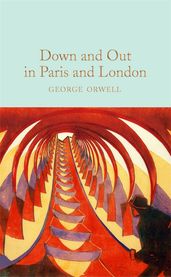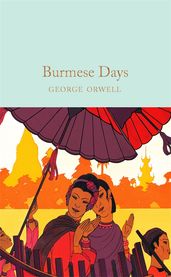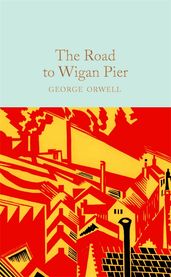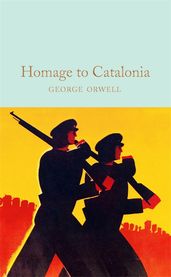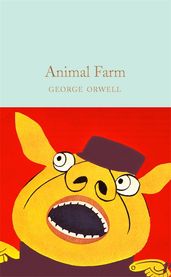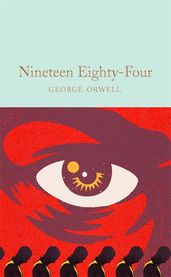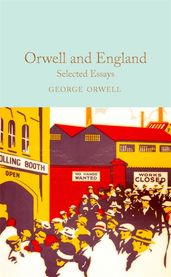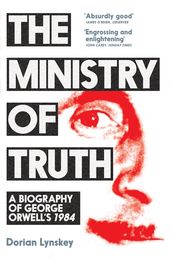The ultimate guide to George Orwell’s books
Dorian Lynskey delves into the career of one most influential authors of the twentieth century in this guide to George Orwell’s books.

George Orwell is probably best known for his novels Animal Farm and Nineteen Eighty-Four. The latter was published in 1949 to great critical acclaim and has become hugely influential. However, this final novel to be published in Orwell's lifetime was the culmination of a career spent interrogating political ideas in fiction and non-fiction. Here, Dorian Lynskey, author of The Ministry of Truth, a remarkable investigation of how Nineteen Eighty-Four came to be, explains how Orwell’s earlier work is crucial to understanding his most enduring novels. Read on for Dorian Lynskey’s guide to George Orwell’s books.
Discover the most insightful George Orwell quotes.
George Orwell’s career is unusual in that most people start at the end and work backwards. Prior to the publication of Animal Farm in 1945, Orwell had published four novels and three works of non-fiction, but only The Road to Wigan Pier had sold in significant numbers and none had furnished him with enough royalties to survive as a full-time author. In fact, most of his books and journalism would likely have fallen out of print if not for his two deathless late masterpieces about the psychology and practice of totalitarianism.
Orwell’s earlier work, however, is essential to understanding those books. Nineteen Eighty-Four, in particular, was a culmination of ideas he had been turning over in his mind throughout his working life. In his first four novels, we see the recurring story of an unhappy individual who rebels against a stifling social orthodoxy – imperialism, religion, capitalism, suburbia – and winds up thoroughly defeated, albeit less violently than Winston Smith. Something in him was drawn to failure.
In Orwell’s non-fiction, meanwhile, we can trace the evolution of a political philosophy in which social justice goes hand in hand with freedom of speech and a deep respect for the individual. Down and Out in Paris and London, the debut book which turned the old Etonian and former colonial policeman Eric Blair into the radical journalist George Orwell, revealed the politically naïve 29-year-old’s compassion for the downtrodden and his appreciation for human eccentricity. The Road to Wigan Pier was his spiky argument for a form of socialism that truly understood the English worker. Homage to Catalonia described the experience of fighting for a maverick socialist faction in the Spanish Civil War, which led him to the shocking revelation that Stalinism was no better than fascism. Both Animal Farm and Nineteen Eighty-Four stemmed from Orwell’s post-Spain desire to understand and explain the nature of totalitarianism, and to discredit Stalin’s corruption of the left. It may be uncontroversial now, but in the 1930s Orwell’s liberal-minded, distinctly English form of democratic socialism was by no means the norm.
Orwell’s books were augmented, and often outdone, by his extraordinary output of journalism, ranging from ambitious essays on political thought and national identity to groundbreaking cultural criticism to fond celebrations of pubs and junk shops. Almost all of it is still worth reading. It is remarkable to think that the famous line inscribed on the wall next to the statue of Orwell outside the BBC – ‘If liberty means anything at all, it means the right to tell people what they do not want to hear’ – was not even published in his lifetime.
Orwell sometimes imagined that, if he had been born in an era free from war and tyranny, he would have enjoyed a quieter, more conventional literary life, but his work suggests that, on the contrary, the worst of times brought out the best in him. The consistent thread that runs from his first book to his last is the sense of an agile, voracious mind grappling as honestly as possible with the nature of his country and his times in the hope of improving both. It may not have been the career he wanted, but it is one to cherish.
George Orwell’s books
Down and Out in Paris and London
by George Orwell
The young Orwell applied a fair bit of artistic license to his stories of life among the underclass on both sides of the Channel. For all its exaggerations and elisions, the storytelling is vigorous and often hilarious, while Orwell’s urge to throw off his own privilege and empathise with outsiders is bracingly sincere.
Burmese Days
by George Orwell
Orwell’s first novel drew on his five years stationed in Burma with the Indian Imperial Police and writhes with the guilt that he felt about his complicity in a despotic system that pretended to be noble. His jaded protagonist John Flory is the first of Orwell’s impotent loners, painfully aware that he is part of something dishonest and corrupt but unable to make his escape.
The Road to Wigan Pier
by George Orwell
A book of two halves. The first is a rigorous piece of reportage which vividly conveys the challenges of working-class life in the north of England. The second is an idiosyncratic, sometimes waspish polemic which advocates socialism while ruthlessly caricaturing socialists. It’s a book determined to discomfit its own readers.
Homage to Catalonia
by George Orwell
Attacked or ignored at the time for exposing the ugly truth about divisions within Spain’s anti-fascist left, Orwell’s account has since become the most widely read book about the Spanish Civil War. Acute political observations mingle with tragicomic anecdotes about six months on the fringes of a conflict, where there was far more waiting than fighting.
Animal Farm
by George Orwell
The only book that Orwell found painless to write is also the easiest to read. Billed as “a fairy tale,” it turns Russian history between 1917 and 1943 into a farmyard allegory that even a 10-year-old can appreciate. The book’s politically motivated rejection by several publishers (Stalin was a vital wartime ally) strengthened Orwell’s commitment to inconvenient truths.
Nineteen Eighty-Four
by George Orwell
The first persuasive study of the totalitarian mindset wasn’t a non-fiction work but a novel: part thriller, part love story, part essay, part postmodern exploration of what happens when the truth ceases to function. Explosive upon publication, it is born again for every generation because of the range of Orwell’s interests (power, propaganda, surveillance, organised deceit), the ingenuity of its language and the emotional drama of Winston and Julia’s struggle with the inevitable.
Orwell and England
by George Orwell
A thoughtful introduction to Orwell’s Swiss-army-knife versatility as a journalist. Designed to rally socialists behind the war effort, ‘England Your England’ endures because of its timeless insights into English identity. ‘Notes on Nationalism’ remains an essential text on ideology, bigotry and cognitive bias, and the delightfully personal ‘As I Please’ columns for Tribune are no less essential.
Discover more about George Orwell’s most famous novel in Dorian Lynskey’s The Ministry of Truth:
The Ministry of Truth
by Dorian Lynskey
George Orwell’s last novel, 1984, has become one of the most iconic modern novels in the world. In The Ministry of Truth, Dorian Lynskey explores Orwell’s influences, from his experiences in the Spanish Civil War to classic utopian and dystopian fiction. He also examines the phenomenon the book has become, and how the ways it has been read have changed over time. This remarkable and original book is a must for anyone with an interest in Orwell or how our culture has developed.
Get into the greatest classic novels, starting with these beginner-friendly classical reads.
